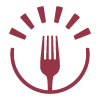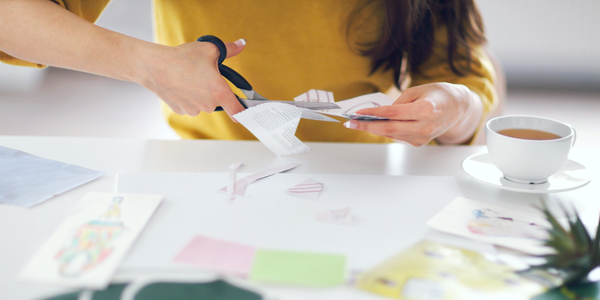
Bad habits aren't very easy to break.
For most of us, we feel panicked if we leave our cell phones at home, or we think that our world will come crashing down if we cant check our email, or update our Facebook status.
In this day and age, multi-tasking is an art form; people praise you if you can do it, but find you unproductive if you can't!
With so much going on in our lives at once, some of us physically force ourselves to get out of bed every morning.
These habits and the constant need to hit the snooze button represent what most of us typically live with on a continuous, daily basis.
These are also daily practices that can turn into unhealthy, bad habits if we aren't careful.
“Multi-tasking, our dependence on technology, and being too slothful can actually take years off your life,” says Christy Shatlock, MS/RD, and one of the lead dietitians for BistroMD.
“With the convenience of technology, with our need to relieve stress, and with our desire to get more than enough sleep, it’s important that we are mindful of our habits, and that we take the right steps to make sure we don’t neglect our health.”
Christy, one of BistroMD's lead dietitians, is going to share with you some helpful tips on how to manage these habits properly, and how you can stay healthy in an age that makes it easy to neglect your nutrition.
Your Social Status: Neglecting Your Health
Every day, 250 million people update their status on Facebook. Updating your status doesn’t take long, and it’s good to socialize with other people. It's when you spend hours of your time on Facebook, and on other social media sites every day, that this turns into a bad and addicting habit.
“Social media is great, but it can also be very bad for your health if you aren’t careful,” says Christy. “In fact, according to a recent study conducted by The New England Journal of Clinical Nutrition, the prevalence of obesity in adults increasing from 23%-31% is partly influenced by technological activities that promote inactivity, including social media.”
Obesity, on average, can cut your life short by at least 12-15 years, while being overweight cuts an average of 6-10 years off your life.
In order to avoid this growing health epidemic, it’s important you prioritize your time spent on social media to prevent this from turning into a bad habit. At the most, 30 minutes per day should be plenty of "you" time to cyber-socialize.
Instead of posting typical status updates, post things that will inspire yourself and others to get up and get a move-on.
“In the age of social media, you can motivate yourself and others by making posts that relate to your own personal health and wellness,” says Christy. “Tell your friends, ‘I’m going to the gym’ or ‘I’m going to walk for my health.’ You can also make it fun and interactive by tagging your friends in various posts while encouraging them to do the same.”
Your Cell Phone is Telling You to Hang Up
You’ve heard affectionate nicknames like “crackberry” being related to our addiction for cell phones. With thousands of text messages being sent daily, and with hundreds of phone calls being made, nicknames like "crackberry" show just how dangerous our dependency on cell phones has become.
“A nickname like ‘crackberry’ shows you just how addicted we are to cell phones,” says Christy. “Addiction can be detrimental to your health, especially when it comes to something as easily available as cell phones.”
People often associate the unhealthy side effects of cell phone use with radiation emission, but research has shown otherwise.
“Study after study has shown that the problem with cell phones has nothing to do with radiation; it's the dependence we have on them,” says Christy. “We have to talk on them when we drive, we text until our thumbs fall off, and we neglect our nutrition when we hop on a pizza delivery app that helps us stuff our faces.”
The convenience of cell phones makes us counter-productive, when we actually think we are being productive. Our health suffers because of it, and most people are too distracted to even notice.
“In a study conducted by Ball State University, researchers found that the average person spends 9 ½ hours on their cell phone daily,” says Christy. “This is an excessive amount of time, especially when you only need one hour of exercise each day, 5 days out of the week to be healthy and active.”
Try to limit your cell phone time by prioritizing your phone calls and messages. If it’s something that can wait until later, use your cell phone as a proactive tool to help you get your daily hour of exercise.
“Rather than using your cell phone to make phone calls and to send text messages, download a music app that you can use at the gym or when you go for a walk,” says Christy. “Most smart phones also have daily food diary apps and healthy lifestyle apps that can help you stay focused on your health. This helps you avoid the bad habit of cell phone use overload, which frees up the time you need to stay healthy."
Multi-Tasking Meltdown
If you have looked for a job in the past few months, most employers require that qualified candidates possess the ability to multi-task.
“Multi-tasking can help you build a stronger skill set, but it can also be bad for your health if you work yourself to death,” says Christy. “It's normal to feel tired at the end of the work day, but if you find yourself mentally and physically drained at the end of each work week, you may have a serious health problem on your hands.”
With many people in today’s society classifying themselves as workaholics, it is no wonder that cases of clinical depression and anxiety have increased by over 15% in the past decade.
Because of this, people often turn to unhealthy snacks and junk food to give them the energy they need to get through their workload. Generally, caffeine, energy drinks, and salty sugar-coated snacks can only give you an energy jolt that lasts for so long.
“This increase in depression and anxiety has climbed because of our society’s need to multi-task,” says Christy. “There are simple things you can do at home and at the office to prevent yourself from falling into a hole of inactivity when it comes to your workload. If you work in a tall building, take the stairs over the elevator. Take yourself away from the computer by going for short walks, and take frequent, small breaks, where you stretch, or visit another co-worker.”
Instead of turning to junk food to keep your eyes open throughout the day, make sure you eat a good breakfast in the morning before heading to the office, and snack on things like bananas and almonds rather than chips and cookies. Both of these provide your body with essential nutrition for natural energy and contain antioxidants that prevent you from getting sick.
Sloth Spells T-R-O-U-B-L-E
Slothfulness is one of the seven deadly sins for a reason, and it’s a habit that seems to be steadily increasing among Americans.
“Society’s promotion of convenience and technological dependence has made us all more slothful,” says Christy. “Most of the technology consumed by people today promotes inactivity, causing us to sleep longer and more frequently than we did ten years ago.”
Your body’s natural reaction to feeling tired is to sleep. If you multi-task to the maximum during the week, you are more likely to crash on your days off, which encourages inactivity. Internet, TV, and computers don’t help with these slothful desires, as sitting and lying around the house only signal to your brain that you are too tired to do anything else.
“People underestimate the power our habits have over our brain,” says Christy. “If you are constantly lying on the sofa, or always sitting around, these habits tell your brain to keep your body at rest. This leads to further inactivity and can become a vicious cycle of too much sleep, and not enough physical activity.”
Oversleeping has been shown to increase your risk of heart disease, diabetes, obesity, and even death, ranging anywhere between 6-10% in some cases.
On average, you should get between 6-8 hours of restful sleep each night. Sleeping longer than this on a daily basis can lead to sleeping disorders, and can lower your energy levels dramatically.
If you find it tough to sleep at night, set aside an hour every day to exercise.
“Exercising an hour each day will actually help you get more restful sleep,” says Christy. “Getting a night of restful sleep will actually give your body the natural energy it needs to get through your work day, which prevents you from slipping into slothful activity."







